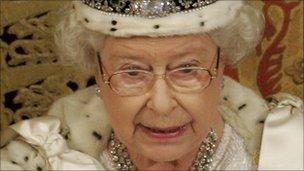Royal funding changes become law
- Published
- comments

The Queen has agreed to play her part in spending cuts across the UK
The biggest change for 250 years to the way the Royal Family is financed will be passed into law later.
The Civil List, which dates from 1760, and the grants paid for travel and upkeep of palaces are to be replaced by a single Sovereign Grant from 2013.
The size of the grant will be 15% of the profits made by the Crown Estate.
Buckingham Palace has called it "a modern, transparent and simpler way of funding the head of state", but critics say it is economically indefensible.
BBC royal correspondent Peter Hunt said: "The last significant parliamentary debate about royal finances took place in the year the current chancellor was born, and after Prince Philip had declared on American television his family was in the red and might have to move into smaller premises.
"Four decades on, the Queen's husband has remained silent while her nineteenth chancellor, George Osborne, has introduced a new Sovereign Grant."
After announcing the change in his Spending Review late last year, Mr Osborne said it should ensure "my successors do not have to return to this issue as often as I have had to".
Property portfolio
The Sovereign Grant Bill, external introduces a single payment given to the monarch based on 15% of the Crown Estate's revenue from two years previously.
Starting from 2013-14, this funding arrangement will last seven years before it is reviewed.
The Crown Estate has a property portfolio which includes, among other things, Regent Street, Windsor Great Park and much of the UK coastline.
The grant is expected to be £34m in the first year, in line with recent royal spending, our correspondent added.
In the past, the monarch received money from three different government departments: funds for the Civil List from the Treasury; a Department for Transport grant for travel costs; funds for maintenance of royal palaces and communications from the Department for Culture, Media and Sport.
The campaign group Republic, which calls for an elected head of state, has described the changes as economically and morally indefensible.
"Pegging royal funding to Crown Estate revenue makes no sense at all," it has argued.
"The two are not related. Crown Estate revenue has always been there to provide funds for the government."
It wants the monarchy to be subject to an annual budget, just like government departments.
- Published4 July 2011